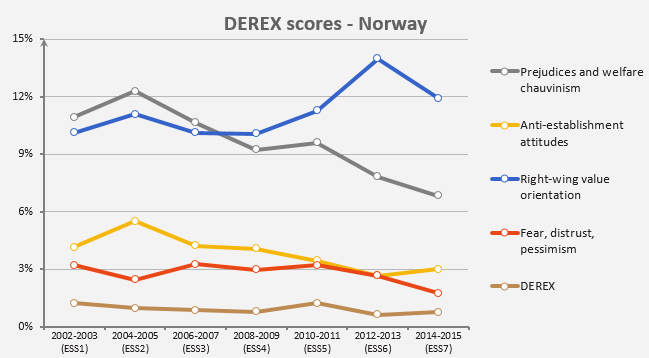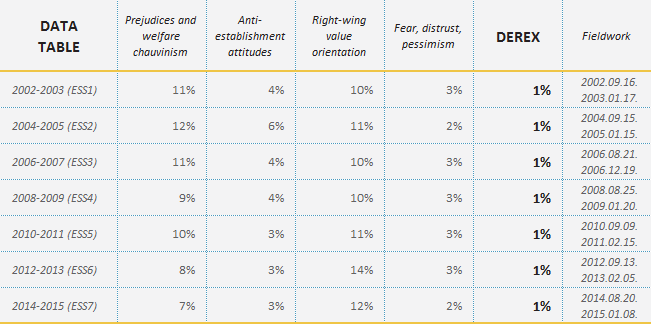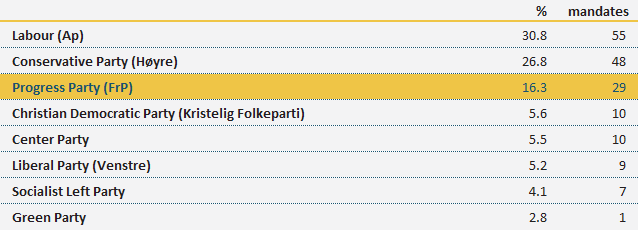Norway
Factsheet
| ETHNIC MINORITIES: | |
|
Roma: |
0.22% |
| RELIGIONS: | |
|
Church of Norway: Other Christian: Muslim: |
85.7% 3.4% 3.0% |
| NET MIGRATION: | 171,232 |
| POP. GROWTH RATE: | +1.3% |
| GDP GROWTH: | +1.1% |
| GDP PER CAPITA: | 99,558 |
| UNEMPLOYMENT: | 3.5% |


Progress Party (Fremskrittspartiet, FrP)

The party was founded in 1973 when Anders Lange established the Party for a Strong Reduction in Taxes, Duties and Public Intervention (ALP). At the time, the party's philosophy was characterized by a sharp criticism of the socialist welfare state, typical in Scandinavian countries. The essentially neo-liberal and neo-conservative party first entered the Norwegian national assembly in 1973 with 5% of the votes. Following the death of Lange, the party went into a decline and managed to receive a mere 1.9% of the votes cast in the 1977 election. In 1978 the leadership of the party was taken over by Carl I. Hagen and it also changed its name to FrP. The organization recognized social and closely related ethnic tensions existing in Norwegian society. Starting in the second half of the 1980s, the party increasingly pursued anti-immigration and anti-Islam policies. This led the organization to a breakthrough. With a single slip in 1993, between 1989 and 2009 support for the party fluctuated between 13 and 23%. After gaining 16.34% of the vote in 2013 it secured cabinet positions. Capturing 29 seats in Norway's 169-strong parliament, it entered into coalition with Erna Solberg's Conservative Party. FrP is frequently criticized because Breivik was a member of the organization between 2002 and 2009. While no link has been established between Breivik's terrorist act and party organizations, the party chairman, who resigned in 2006, is blamed for inflaming the public discourse and escalating opposition to immigration and especially Islam. With all that, the party that describes itself as conservative liberal and consistently rejects the far-right label, the FrP may be defined more accurately as right-wing populist than radical. In 2006 the leadership of FrP was taken over by the current finance minister, Siv Jensen. The FrP would not oppose a referendum on EU membership, provided that the initiative is supported by the majority of the population. Currently the party does not see this is an urgent issue, not surprising in the light of poll figures showing that only 25% of the Norwegians would vote for membership. The party strongly favors the country's NATO membership and the consolidation of Trans-Atlantic relations, including closer cooperation with the United States.
The FrP seems to maintain its third place in party rankings, however, the party’s popularity has significantly decreased due to its anti-immigrant stance throughout Europe’s recent humanitarian debates. At the September 2015 local elections the party only received 9.5% of the votes, marking their worst election result since 1993. Progress openly opposes Norway’s agreement to take in 8,000 refugees by the end of 2017, a position which a notable share of the party’s voter base seems to reject. Following the election, party leader Siv Jensen reiterated that Progress is committed to help refugees in the regions bordering Syria, which would serve as an alternative for the criticized agreement.
(Last update on 8. April, 2016)
FrP on the Internet:
Sources:
- Piero Ignazi: Extreme Right Parties in Western Europe. Oxford; New York: Oxford University Press, 2003, Ch. 8.
- Elina Kestilä & Peter Söderlund: „Local determinants of radical right-wing voting: The case of the Norwegian progress party.” West European Politics, 2007, 30:3, pp. 549-572. Available online at http://dx.doi.org/10.1080/01402380701276394
- Reuters: Norway's anti-immigrant party set for worst election result in 22 years, available online at http://uk.reuters.com/article/uk-norway-election-idUKKCN0RE25620150914
- Political Capital
Parliamentary elections - September 9, 2013


Parliamentary elections - September 14, 2009


Parliamentary elections - September 12, 2005

Source: Statistics Norway
Our thematic websites
Political Capital's analyses and activities in English.
Research and advocacy programme focused on the role conspiracy theorising plays in shaping populist and radical politics.
Our project New electoral system in Hungary: watchdogging, advocacy and raising awareness focuses on the electoral reform in Hungary.
Our blog on political and societal extremism and conspiracy theories.
DEREX website is supported by










